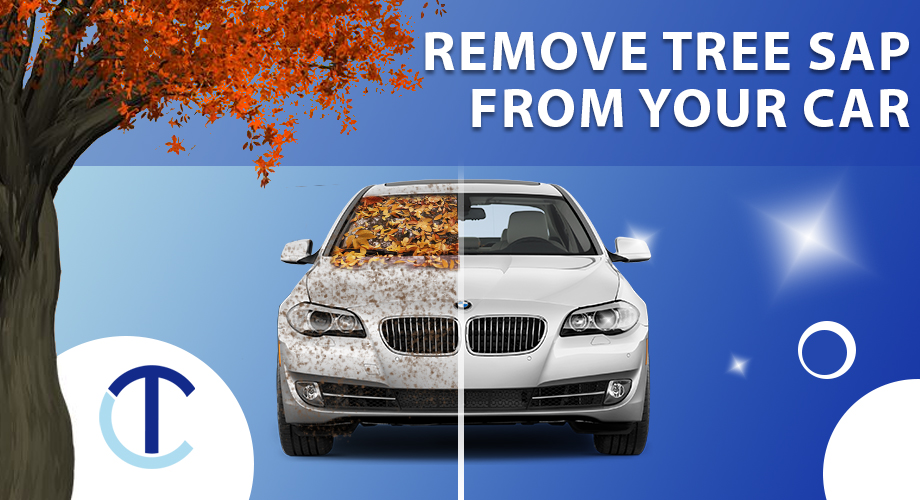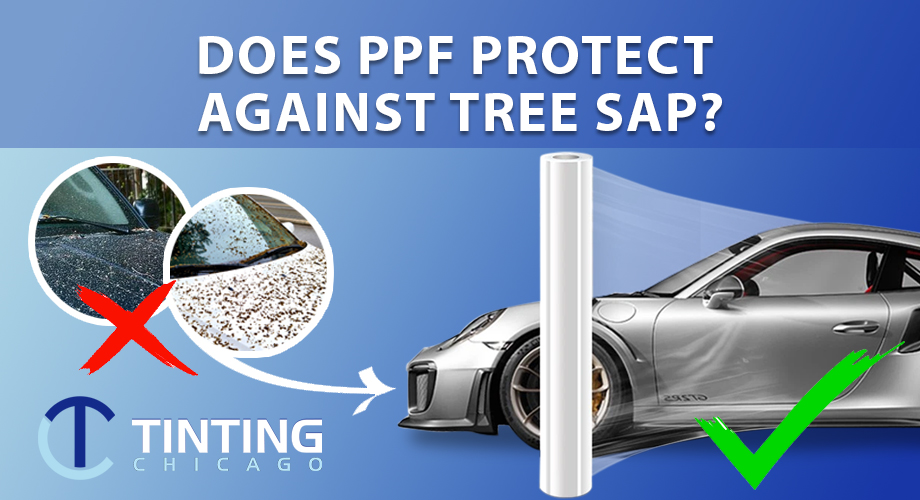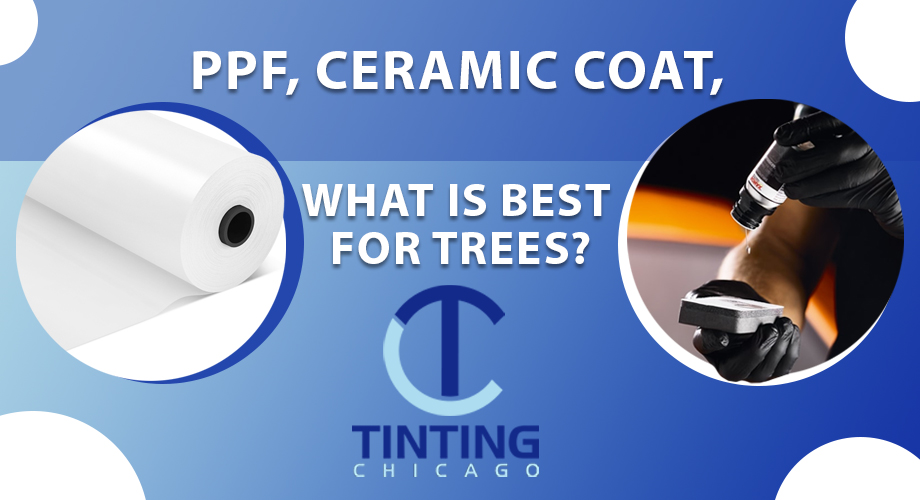


































































































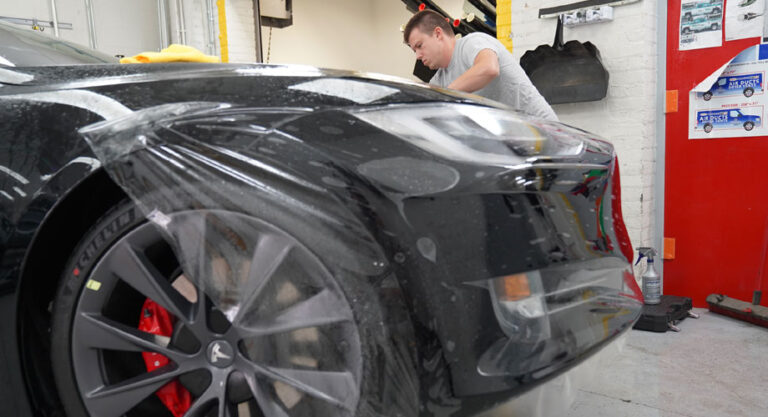
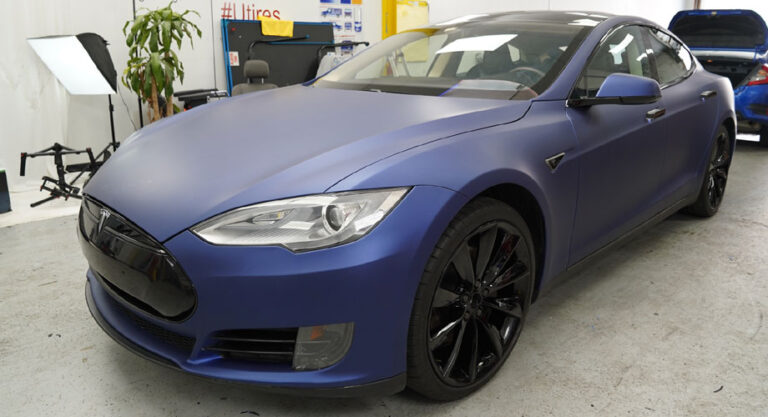

















































































































Tree sap looks harmless at first glance, but car owners know how tricky it can be if you leave it untreated on a car’s surface. When you simply park under a tree to avoid the sun or drive through a wooded area, tree sap can find its way onto your car’s surface. A seemingly minor issue will quickly turn into a big one – stubborn sap can literally eat your car’s paint.
No one is completely safe from sap stains. However, don’t rush to scratch them or you will only worsen the damage. Instead, learn how to remove tree sap from car paint without harming the finish. And not only that – discover how you can prevent it with PPF. Keep reading for practical tips and step-by-step instructions.

How can tree sap damage car paint?
Trees produce this viscous fluid to protect themselves from insects and damage. Let’s understand why tree sap is a paint killer. This sticky mixture of sugars, resins, and other organic compounds is incredibly adhesive. When it hardens on your car’s surface, don’t even try to remove it. You cannot ignore it either unless you want to deal with paint damage. First,
- Acidic composition. Some types of tree sap are acidic. If you leave such stains on your car’s surface for too long, they can slowly eat away at the clear protective layer of paint. It will result in permanent stains or rough patches on the surface.
- Heat makes it worse. On hot, sunny days, sap can act like a magnifying glass. It traps heat and UV rays and focuses sunlight onto the paint. Over time, the paint underneath can fade or even crack.
- Sticks firmly. When sap dries, it hardens and sticks very strongly to the car’s surface. If you leave it for long, you will hardly remove it without paint damage.
4 methods to remove tree sap from your car’s paint
Don’t panic if you spot the problem on your vehicle. There is nothing disastrous about it if you handle the problem correctly. So, here’s how you can remove the stain.
1. Isopropyl alcohol technique
You will need 90% isopropyl alcohol, a soft microfiber cloth, distilled water, and your preferred car wax.
Alcohol can harm the paintwork. So, it’s important to conduct a test on a small hidden area before you proceed. If everything is ok, pour some substance on a clean microfiber cloth. Then, apply it over the sap and leave for 30-60 seconds. Now, slowly wipe the area, but avoid aggressive rubbing. Use water to remove the alcohol completely and apply a layer of car wax to protect the paint.
2. Specialized commercial sap removers
For this method, you will need a specialized commercial sap remover. You can try 3M Adhesive Remover or spay WD-40. Also, prepare a soft microfiber cloth, warm water and a towel.
First, read the products instructions – always follow these to avoid unpleasant surprises. Apply the remover to a microfiber cloth and gently press the cloth over the sap. Wait a little and clean the area. Don’t do it in direct sunlight, as the product may dry too quickly. Once the sap is removed, rinse the area with warm water and dry it with a clean towel.
3. Warm water and soap technique
All you need for this simple method is warm water, car wash soap, a microfiber cloth, and a soft-bristled detailing brush.
Mix warm water with the car wash soap to get a nice soapy solution. Soak the sap-stained area for a few minutes. When the sap is softened, use a cloth to gently rub the soapy solution into the spot using the microfiber cloth. For stubborn sap, carefully scrub the area with the brush. Then, rinse it with clean water and dry the spot with a clean microfiber towel.
4. Clay bar treatment
You will need a clay bar detailing kit for stubborn stains. It usually includes the clay bar itself and a lubricating solution.
A clay bar kit comes with instructions – so read them first. Then, spray the lubricating solution generously over the sap-stained area. Then, gently rub the clay bar over it. Repeat it until you fully remove the sap. After that, wipe down the area with a clean microfiber towel to remove any remaining lubricant.
How do detailers remove tree sap?
Car detailers use more advanced methods to remove tree sap from auto paint. They may use a machine polisher with a mild abrasive compound to gently remove the top layer of the clear coat and take the sap with it. Some detailers use heat guns or steam cleaners to soften hardened sap. This method is particularly useful for older, dried sap that has bonded tightly to the surface. Alternatively, for large or hardened sap deposits, detailers also use plastic razor blades to scrape off the sap. Plastic razors are safer than metal ones, as they do not scratch the paint when used correctly. However, every detailer recommends to act ahead and take measures to avoid tree sap damage. PPF is one of these preventive measures.
our latest news!
How does PPF protect against tree sap?
Paint Protection Film (PPF) is a thin transparent film that is applied all over the car’s surface. It creates an invisible shield that guards the paint from tree sap and other everyday damage. How does it differ from wax or ceramic coatings? PPF creates a physical barrier that doesn’t allow sticky substances to reach the paint.
PPF is made from a flexible, clear material that stretches to fit your car’s surface. This layer blocks tree sap, dirt, and chemicals. Another great PPF feature is its self-healing ability. Small scratches or marks disappear when you expose them to heat. Plus, its water-repellent surface makes cleaning easier.
How does PPF work against tree sap? When it falls on PPF, it stays on the surface and doesn’t stick too tightly. The film doesn’t allow sap to bond to the paint, and you can easily wipe it off without scrubbing or scratching.
PPF is a considerable investment. But think – you will avoid costly paint repairs and your car will look newer for longer. It excellently maintains your car’s resale value and cuts down on the time and effort needed for cleaning.
If you are looking for this upgrade in Chicago or the neighborhoods, Tinting Chicago is to your service. We have several workshops in the area where we install PPF and provide other detailing services for cars of all makes and models. Our technicians have solutions for all budgets. You can consider a partial PPF and protect only the most vulnerable areas of your vehicles. Alternatively, you can install a full clear bra and even protect your windshield with a special film. We offer the best PPF materials on the market and provide long-term warranties on all our services. Whatever you need – just give us a call and we will find the optimal solution!
FAQ
How does PPF protect car paint from tree sap?
PPF creates a transparent layer that stops tree sap. It forms a physical barrier and prevents bonding of stains with the surface. Even if tree sap is left on the car’s surface – you can remove it much easier from PPF than from the paint itself.
Can PPF prevent sap from damaging the paint?
Yes, PPF blocks sap’s chemicals, and they do not contact the paint directly. Even if sap stays on the surface for a while, it will not cause fading. This protects the paint from permanent damage.
Does PPF make sap removal easier?
Absolutely! PPF has a smooth, non-stick surface that stops sap from clinging tightly. You can wipe off sap more easily – no harsh scrubbing is needed.
Does PPF protect against sunlight and heat damage?
Yes, modern PPF materials are UV-resistant and effectively block sunlight. This feature doesn’t allow sap to harden and damage the paint..
Is PPF worth it for long-term protection?
PPF offers round-the-clock protection against sap, scratches, and UV rays. It helps your car look newer for longer and reduces maintenance efforts. Plus, it helps keep your car’s resale value high for years.





























 Send a message
Send a message Send a message
Send a message